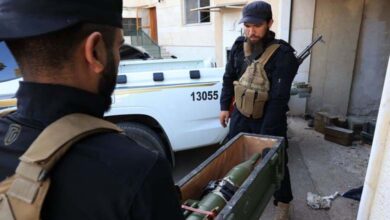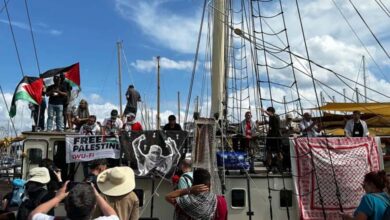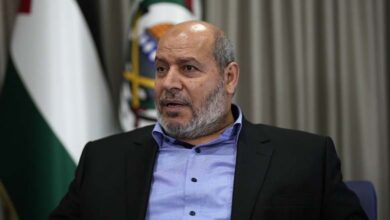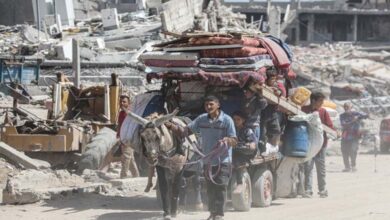The bitter memory of displacement keeps them from fleeing south… Painful stories from the heart of Gaza
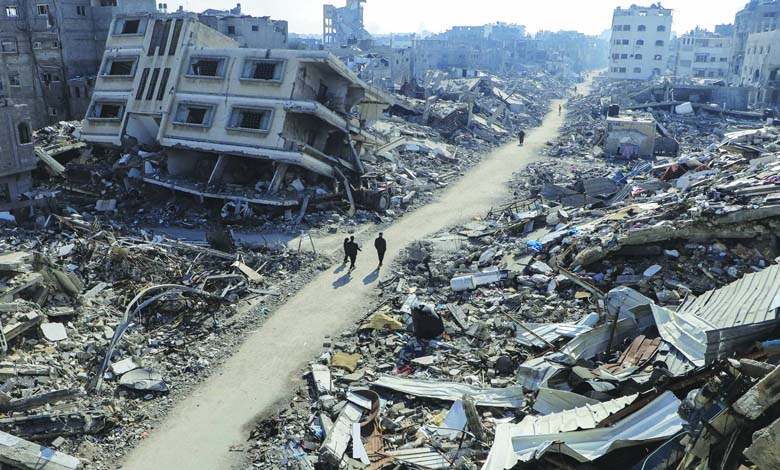
For the residents of Gaza City, the choice is agonizing: either flee into the humiliation and uncertainty of displacement, or remain under the fire of war.
Ilham Shomali, like hundreds of thousands of Gaza residents, is facing this grim dilemma. Should she flee again with her family, enduring once more the bitterness of exile, or defy Israeli evacuation orders ahead of what is expected to be a massive assault on Gaza’s largest city? This was reported by The New York Times.
At 47, Shomali has already fled her home once since the war began nearly two years ago, only to return when southern Gaza became too dangerous.
This time, she says her family will move to another neighborhood within Gaza City, which she believes might be safer in case of an Israeli attack. But she insists: they will not leave entirely.
“We know that if we leave, we will never come back,” she says. Many of her neighbors feel the same.
A deep mistrust of Israel
On Tuesday, the Israeli army ordered all residents of Gaza City to evacuate, preparing for an all-out assault to take control. Already, nearly 40 percent of the city is under Israeli control, with several high-rises destroyed.
Yet many residents say they cannot—or will not—leave. In interviews with The New York Times, Palestinians in the city expressed deep distrust of Israel, convinced they would never be allowed to return if they fled.
Others cited lack of money or essential medical needs that could not be met if they left. Almost everyone has already been displaced at least once, many several times. Few believe any place in the Strip is safe.
Dr. Bakr Jaoud, a physician at Nasser Children’s Hospital, where his 11-year-old son Saif al-Din receives treatment for epilepsy, said: “I cannot leave Gaza City for the south. I simply cannot.” Most of the medicines his son needs are already gone, and conditions in the south would be far worse.
The anguish of leaving, the terror of staying
Israel portrays Gaza City as a Hamas stronghold and says it must take full control to defeat its fighters. Civilians have been urged to flee to al-Mawassi, a coastal strip designated as a “humanitarian zone.”
But even before the war, al-Mawassi lacked housing, sanitation, water, food distribution, and medical facilities. Israeli strikes there have killed dozens, despite its supposed safety.
Those who choose to stay describe the horror of watching neighbors hurriedly pack what remains of their belongings. Hidaya al-Falouji, 30, says she will stay with her children. Their home in nearby Jabalia was destroyed earlier in the war, in a strike that killed her husband and brother. She recalls leaving once before to live in a tent, calling it abandonment: “I cried the whole way. I will not leave. I will not give up Gaza. I will either die here or stand firm in my city.”
Trauma of displacement
The bitter memory of displacement looms over many. Mohammed al-Najjar, 36, a freelance photographer, recalls living for a year in the south with his wife and two children before the war. It was as bleak and devastated as the north, and they eventually returned because the south offered “no resources, no infrastructure, no safety.”
He estimates that building a tent again in al-Mawassi would cost about $1,000. “If I leave now, I will never see Gaza as I know it again. Even if I return, the city will be completely destroyed.”
Ilham Shomali echoes these fears: the south is not safe, she insists, and her family cannot afford to go there. Instead, they will look for refuge in a western district of Gaza City, hoping it will be less exposed during the assault.
For Dr. Jaoud, the priority is staying close to the hospital—both to treat the wounded and to ensure his son continues to receive care. He has already lost 18 relatives, including his brother and nephew, and now lives in a tent on the beach with his wife and two children, listening to nightly explosions nearby.


